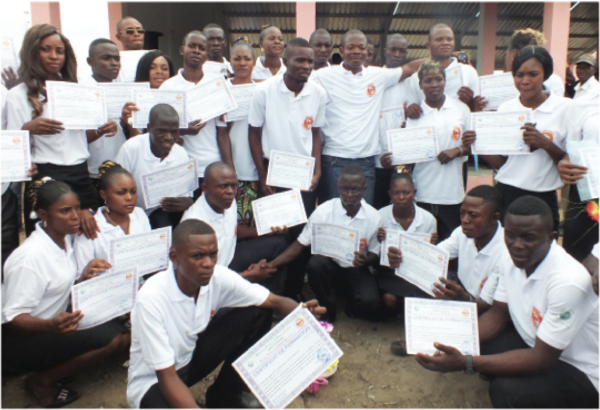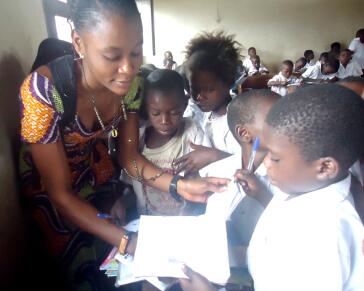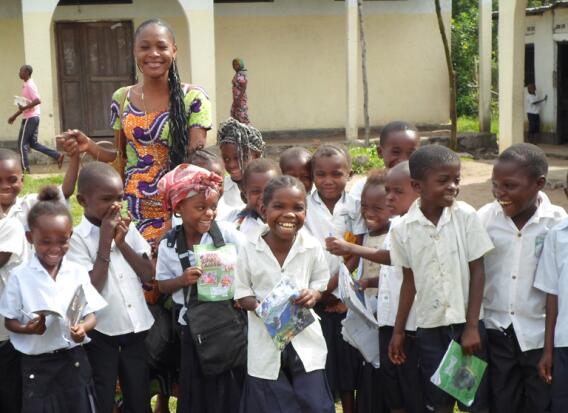First Class Graduates from DRC Teacher Training College

On April 5, 2014 a class of 30 student teachers in the Democratic Republic of the Congo completed their two-year training program and received their teaching certificates. The graduates are the first class of teachers to complete training at the Planet Aid-sponsored DNS Teacher Training College at Mbankana. In September, with the help of the DRC's Ministry of Primary, Secondary, and Vocational Education, the new teachers will start employment at rural primary schools.
Reflections on Education, Gender and Development by a New Teacher in the DRC
Noelly is among the new class of graduates from the Mbankana DNS Teacher Training College. She is a spirited 21-year- old who speaks passionately about teaching and helping her country.
"I want to work for sustainable development by teaching in rural primary schools," she says. "For the development of our country, education means a lot."
Noelly did her student teaching in two primary schools near Mbankana. She indicates that discipline was often a problem among the pupils and the teachers, and that the instructional methodology, often involving tedious rote exercises, did not engage students.
Inspired and Innovative
 Noelly introduced new methods that she had learned at the college, which involved group work and problem solving. She sought to create more activity in the classroom and also challenge the students. She fashioned simply teaching materials from whatever she could find, using bottle caps, nails and wood to help her teach math and other subjects.
Noelly introduced new methods that she had learned at the college, which involved group work and problem solving. She sought to create more activity in the classroom and also challenge the students. She fashioned simply teaching materials from whatever she could find, using bottle caps, nails and wood to help her teach math and other subjects.
"I love teaching because I learn twice when I teach. I always feel free in my thoughts and I am updating my knowledge through study. Children also teach me by their behavior and reactions."
Reflecting back on her experiences, Noelly is thankful for the training she received at the college. It helped her become the kind of teacher she wanted to be. As a little girl growing up near Kinshasa, she had lost her parents at age 12 and could not afford to continue school. Fortunately, a teacher came to her aid, offering to pay her fees until her relatives could manage. Noelly has remained forever grateful to this teacher, whose benevolence still inspires her both inside and outside of the classroom.
Deflecting Scorn
Noelly indicates that her desire to be a teacher has sometimes brought her scorn. Girls are expected to be quiet and reserved in traditional Congolese society, but she had learned long ago to be outspoken. "Do you think you are a boy?" she would be told by male and female peers in the program.
"A woman is generous by nature , she thinks of the welfare of others . For me to be a woman is to take greater responsibility for improving the situations of others."
The remarks did not dissuade Noelly, but instead made her more determined. "Today I am a competent girl without fear of standing in front of people and taking up challenges," Noelly says.
 When her class began doing local community work—a core component of the training—Noelly chose to focus on women's issues, organizing discussions among villagers to improve their awareness. The groups involved both male and female participants, and the fact that she, a woman, had organized the group encouraged women to participate. It emboldened them to speak their mind about a wide range of issues, from HIV to household work.
When her class began doing local community work—a core component of the training—Noelly chose to focus on women's issues, organizing discussions among villagers to improve their awareness. The groups involved both male and female participants, and the fact that she, a woman, had organized the group encouraged women to participate. It emboldened them to speak their mind about a wide range of issues, from HIV to household work.
As of now, Noelly works as a teacher's assistant at the college, until she begins her job as a rural primary school teacher in September. She socializes with the new girls who have just begun the teacher training program, encouraging them to speak out and take up the challenge and build confidence.
Read more about Teacher Training and the work we do in the Democratic Republic of Congo. You can also read about Noelly on the World at School website.
